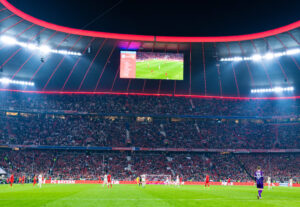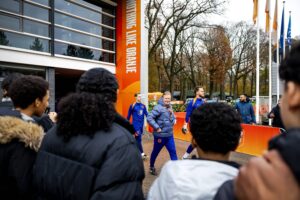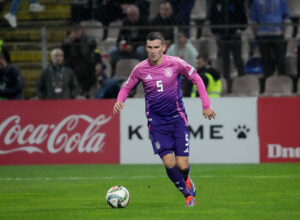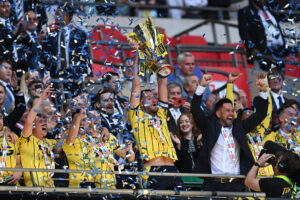Welcome back to the Last Word On Football’s look at some of Liverpool’s most iconic figures. From players to managers, we look at who has an impact during their time at the club that no Liverpool fan will ever forget. Next up is one of Liverpool’s greatest modern-day managers: Gerard Houllier.
Houllier joined Liverpool in 1998 and proceeded to modernize a club that was stuck in the 1980s. The Frenchman would enjoy considerable success with the Reds before some mistakes in the transfer market would cause the team to stagnate and eventually led to his departure in 2004.
During his time at Liverpool, Houllier won one UEFA Super Cup, one UEFA Europa League, an FA Cup and two League Cups.
Liverpool Icons: Gerard Houllier
Joint Managers
When Gerard Houllier arrived at Liverpool in 1998, it was a very strange situation, being appointed as joint manager with then-boss Roy Evans.
Evans had largely underachieved with Liverpool. The Englishman had a very talented squad, with players such as Robbie Fowler and Steve McManaman, but had only won one League Cup. The team was blighted with a culture that consisted of hard-partying and ending up on the front pages of the tabloids. Instead of being lauded for their football, Liverpool was simply known as the ‘Spice Boys’.
Houllier was appointed with the goal of changing this culture, but it would never work while he was sharing managerial duties with Evans.
Players were confused by the arrangement and tension was created amongst the two men when they had frequent disagreements over everything from transfers to team selection.
The situation was best summed up by Fowler.
“How could it work?” the striker later said. “Who had the final say in team selection? Who was in charge? The players didn’t know, and straight away that made it unworkable.”
In classic Evans style, the former Liverpool player decided to resign in the best interests of the club. This marked the end of an era. Evans was the last member of Liverpool’s famous Boot Room to take charge of the club – he had been a loyal servant for 35 years and left in November 1998.
With Evans gone, Houllier could finally start implementing his ideas and the long-needed modernization of Liverpool.
The Modern Revolution
Houllier had a five-year plan to restore Liverpool to glory and it centred around two aspects. First, he modernized the club’s set up with innovations such as overhauling the training ground and changing diets in order for them to be more nutritious.
He also started to instil discipline. This meant selling any of the infamous Spice Boys who were not crucial to the team’s success. In the summer of 1999, he sold Paul Ince, Jason McAteer and David James to name just three casualties of his early reign.
They were replaced with players such as Sami Hyypia and Dietmar Hamann, who would go on to become key players.
While 1999/2000 was not the club’s most successful season, with the Reds finishing fourth in the Premier League and not winning anything, a great season was on the horizon.
The Treble
With a mix of young players and foreign imports, Houllier’s Liverpool would have an incredible season.
There were the unforgettable triumphs in the League and FA cups as well as a UEFA Cup victory.
The League Cup was an incredibly tight affair with Fowler scoring in the first-half before opponents Birmingham City equalized. The game would go to penalties where Liverpool pulled out the win after Birmingham striker Andy Johnson missed a decisive spot-kick.
The FA Cup was simply known as the ‘Michael Owen final’. Liverpool were played off the park by Arsenal and somehow were only down 1-0 after 75 minutes. Owen then sprang into action. The young striker equalized in the 83rd minute after Arsenal failed to deal with a free-kick. He then outpaced Lee Dixon and Tony Adams to score the winner with two minutes remaining.
This game was indicative of Owen’s incredible season. The striker scored 24 goals in all competitions which were key to his Ballon D’or win in 2001.
Finally, the UEFA Cup was an unforgettable back and forth affair with Liverpool winning 5-4. The Reds secured their victory with a golden goal in extra time.
In the Premier League, there were plenty of iconic moments as well. No fan will ever forget Gary McAllister‘s last-minute free-kick winner against Everton. In addition, Champions League qualification was secured with a 4-0 triumph over Charlton Athletic on the last day of the season.
For his team’s efforts, Houllier was awarded the European Football Coach of the Year. Liverpool seemed to be on the right track.
The Heart Attack
After a positive start to the 2001/2002 season, Houllier had to be rushed to hospital in October 2001 during a match with Leeds United. The Frenchman had to undergo an emergency operation due to a heart condition. He would be out for five months.
In his absence, Phil Thompson would take control of the team and he did an admirable job. In November, the club sold Fowler after disagreements with Houllier and youngster Nicolas Anelka was brought in on loan as a replacement in December.
Anelka did a good job replacing Fowler. The Frenchman would go on to score four goals and play well in the team.
And in March 2002, Gerard Houllier returned, albeit in a reduced role while still recovering. He was greeted by a jubilant Anfield ahead of a Champions League game against AS Roma. The players used the crowd’s energy to secure a famous 2-0 win. Despite this win, Liverpool failed to win in Europe that season.
But, they had one of their most successful seasons in the Premier League where they finished second.
Despite their positive momentum, this was the beginning of the end.
Transfer Mistakes
In the summer of 2002, Liverpool chose not to sign Anelka permanently and instead purchased the ill-fated trio of El Hadji Diouf, Salif Diao and Bruno Cheyrou.
Diouf was the worst of the lot. He was a stain on the club with incidents such as the time he was fined for spitting at Celtic fans. In addition, he only scored three goals in 55 games and is the only number nine in Liverpool’s history to go a whole season without scoring.
Former defender Jamie Carragher summed up his time at the club rather well:
“The worst [player he played with] has to be El-Hadji Diouf,” he said. “Actually, I quite enjoyed playing against him as you could kick him then – can’t kick your own players.”
And while Liverpool may have won a League Cup in 2003, a lack of league success meant they failed to qualify for the Champions League in 2003 and 2004.
The 2003/2004 season was the end for Houllier at Liverpool as he was fired at the end of the campaign and replaced by Rafael Benitez.
Despite not winning the Premier League, Gerard Houllier laid the foundations for Liverpool’s future success. The club owes him a huge debt and he will always be a Liverpool icon.
Main Photo






